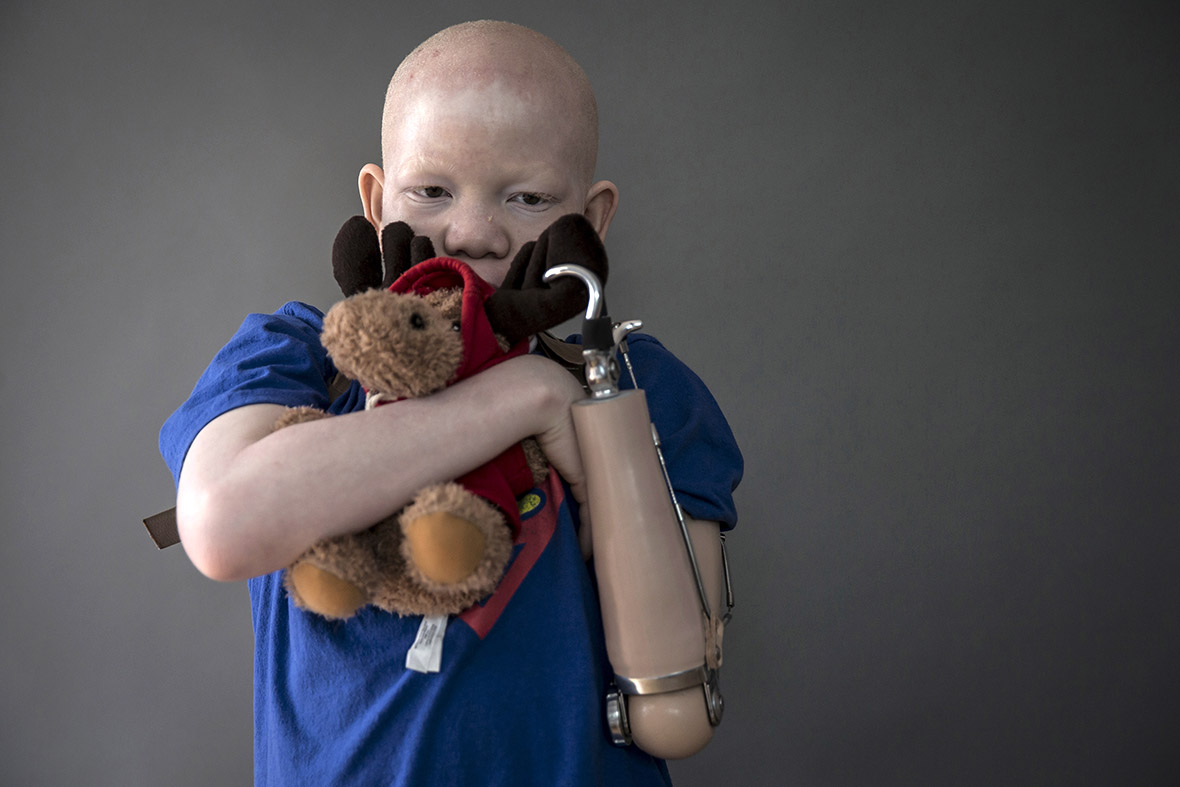Tanzanian albino children mutilated for witchcraft receive treatment in the US [Photo report]
Six-year-old Baraka Cosmas was attacked by men with machetes in his home in Tanzania. The attackers chopped off his right hand and fled into the night with it. Twelve-year-old Mwigulu Matonage was followed into the hills behind his home by two strange men. They hacked off his left arm with a machete. "I watched them wrap my arm in dirty cloths and disappear into the bushes," he said.
Baraka and Mwigulu were both born with albinism. In many African countries, albino body parts are highly valued in witchcraftand can fetch a high price. The dismembered body parts of victims reportedly sell for around $600 (£387), while an entire corpse can fetch $75,000 on the black market. At least 74 albino children have been murdered in Tanzania in the last 15 years. Some believe the limbs are more potent if the victims scream during amputation, according to a 2013 United Nations report.
Albinism is a congenital disorder affecting about one in 20,000 people worldwide who lack pigment in their skin, hair and eyes. It is more common in sub-Saharan Africa and affects about one in 1,400 Tanzanians.


Elissa Montanti, executive director of Global Medical Relief Fund (GMRF), was horrified by stories like these and teamed up with Under the Same Sun (UTSS) to fly five young victims to the US for treatment. The children are staying at GMRF's Dare To Dream house in Staten Island and will be evaluated for surgery and prosthetics at Shriners Hospital for Children in Philadelphia, which provides its services at no cost. The children have been shielded as much as possible from harsh truths, Montanti said. For instance, Baraka has not been told that his father is accused of involvement in his attack and is under arrest in Tanzania. Many attacks on albino children involve parents or close relatives, Ester Rwela, a social worker with UTSS, said.
UTSS is a Canadian NGO working to combat discrimination against albinism. The organisations's director, Don Sawatzky, said the stigma and discrimination against people with albinism is endemic to African culture, not just Tanzania. "The problem goes back in time beyond memory. They are deeply misunderstood and misrepresented worldwide – this is due solely to the colour of their skin."
Thirteen-year-old Emmanuel's attackers chopped off one arm and the fingers of the other and tried to pull out his tongue and teeth. Courtesy of the Shriners Hospital, he has been fitted with a hook for one arm, and a toe was grafted on his other arm to help form a grip. Montanti said she made sure the children's time in America was filled with good memories. "They've had a wonderful summer," she said. "It's safe, with a lot of love, activities and a lot of laughing." Emmanuel blushed as he said he liked seeing the topless women in Times Square who pose for pictures and solicit tips.







Tanzania is holding elections on 25 October 2015. Khamar Kashoro, of the Tanzania Red Cross, said elections see a rise in the number of killings and mutilations. "Politicians believe in superstitious power to win the election. It is their belief that this will encourage voters to like them during their campaign and voting day – so Tanzanians with albinism are in danger. The closer it gets to an election, the more Tanzanians with albinism are killed," Kashoro said. "There have been cases where some of the killers and the witchdoctors have mentioned politicians who are behind them."
Tanzania's federal government has had to issue warnings to politicians standing in the elections that no parliamentary seat will be won by harvesting the body parts of people with albinism. "I want to assure my fellow politicians that there won't be any parliamentary seat that will be won as a result of using albino body parts," deputy home affairs minister Pereira Silima said.
Witchcraft was banned in Tanzania in January 2015, but implementing the law is difficult in a country where such superstitions are firmly entrenched. However, the country has made some progress. In March 2015 four people were sentenced to death for the murder of an albino woman.




Tanzanians with albinism face another lethal danger: skin cancer. Because of a lack of the pigment melanin, which helps protect the skin from the sun's ultraviolet radiation, the skin of Tanzanians with albinism burns easily in the harsh equatorial sunlight. Children often develop facial melanomas, the precursor of cancer.
© Copyright IBTimes 2024. All rights reserved.







